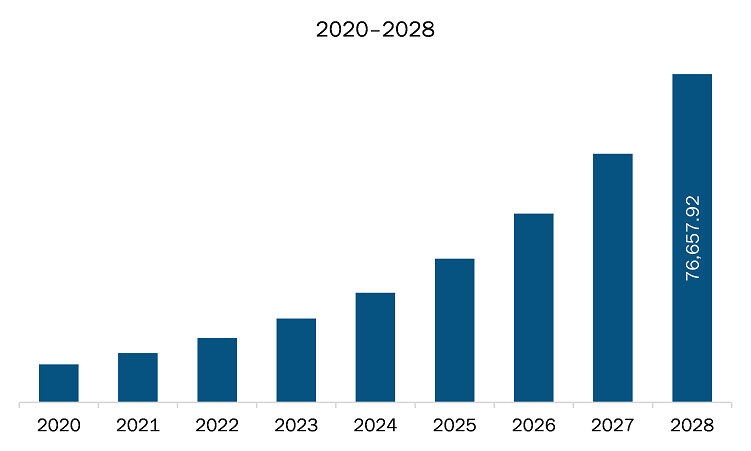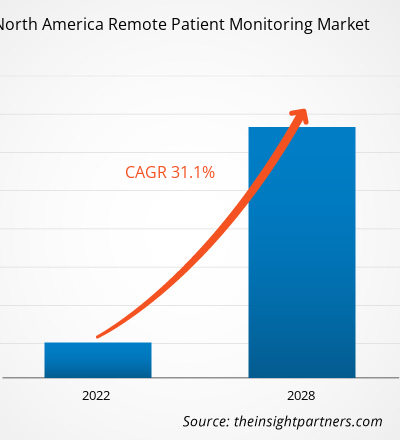The remote patient monitoring market in North America is expected to grow from US$ 11,540.64 million in 2021 to US$ 76,657.92 million by 2028; it is estimated to grow at a CAGR of 31.1% from 2021 to 2028.
With a rise in cases of chronic illnesses such as diabetes and hypertension, there has been a rise in health awareness among population. Also, in recent days, there has been a significant rise in the number of individuals suffering from heart related disorders. These factors have led to increase in the importance of maintaining health among the population in the developed and developing nations. The demand for various health monitoring devices for tracking health status has increased significantly in the recent years. Also, there has been a rise in number of specialty clinics and home healthcare business in countries such as the US and Canada. Also, due to an increase in the disposable income as well as the rate of urbanization in the economies such as Mexico the market is expected to experience growth opportunities. The use of handheld and wearable devices for monitoring vital signs has been increased among the old age population as well as millennial. Owing to the growth in awareness regarding health, the market for remote patient monitoring devices is anticipated to witness significant growth during the forecast period.
North America has experienced a rising number of cases of COVID-19 since its outbreak. The clinical and product development engine has experienced profound disruption as colleagues adjust to remote work environments and lab capacity is reduced. Clinical trials are also severely affected by disruptions in both new enrollment and in keeping existing patients on therapies. The impact of COVID-19 has placed many biomedical sensors companies under pressure. However, it also has had a positive impact on the medical device industry, wherein the demand for R&D activity is increasing, leading to a rise in medical device assistance for the detection of COVID-19. For instance, the researchers of the University Of Illinois Grainger College Of Engineering developed an ultrasensitive test using a paper-based electrochemical sensor that can detect the presence of the coronavirus in five minutes. Furthermore, the Government of Canada is invested $25.8M in COVID-19 research to contribute to the global efforts for research on medical countermeasures against COVID-19. For instance, a research project on “Rapid, Ultrasensitive Clinical Detection of 2019 Novel Coronavirus (nCOVID-19) by Novel Microfluidic Electrochemical Nano-Biosensors” was funded US$ 0.79 million. The Government of Canada provided the funding ($26.8M) for the first wave of COVID-19 research projects through the CIHR, the Natural Sciences and Engineering Research Council of Canada (NSERC), the Social Sciences and Humanities Research Council (SSHRC), the International Development Research Centre (IDRC), the Canada Research Coordinating Committee (CRCC) through the New Frontiers in Research Fund (NFRF), and Genome Canada (GC). Thus, increasing funding by the government in research and development activities anticipated the growth of the remote patient monitoring market.
With the new features and technologies, vendors can attract new customers and expand their footprints in emerging markets. This factor is likely to drive the North America remote patient monitoring market. The North America remote patient monitoring market is expected to grow at a good CAGR during the forecast period.
- This FREE sample will include data analysis, ranging from market trends to estimates and forecasts.
North America Remote Patient Monitoring Market Segmentation
North America Remote Patient Monitoring Market – By Type
- Software
- Cloud
- On-Premise
- Devices
- Cardiac Monitoring Devices
- Neurological Monitoring Devices
- Respiratory Monitoring Devices
- Multiparameter Monitoring Devices
- Blood Glucose Monitoring Devices
- Fetal and Neonatal Monitoring Devices
- Weight Monitoring Devices
- Other Monitoring Devices
- Services
North America Remote Patient Monitoring Market – By End User
- Providers
- Hospitals
- Home Care Settings
- Ambulatory Care Centers
- Others
- Payers
- Patients
- Others
North America Remote patient monitoring market – By Country
- US
- Canada
- Mexico
North America Remote patient monitoring market – Companies Mentioned
- Medtronic
- Koninklijke Philips N.V.
- Boston Scientific Corporation
- Abbott
- OMRON Corporation
- Siemens Healthineers AG
- Nihon Kohden Corporation
- General Electric Company
- VitalConnect
- Cerner Corporation
North America Remote Patient Monitoring Report Scope
| Report Attribute | Details |
|---|---|
| Market size in 2021 | US$ 11,540.64 Million |
| Market Size by 2028 | US$ 76,657.92 Million |
| Global CAGR (2021 - 2028) | 31.1% |
| Historical Data | 2019-2020 |
| Forecast period | 2022-2028 |
| Segments Covered |
By Type
|
| Regions and Countries Covered | North America
|
| Market leaders and key company profiles |
- Historical Analysis (2 Years), Base Year, Forecast (7 Years) with CAGR
- PEST and SWOT Analysis
- Market Size Value / Volume - Global, Regional, Country
- Industry and Competitive Landscape
- Excel Dataset


- Human Microbiome Market
- Trade Promotion Management Software Market
- Virtual Event Software Market
- Integrated Platform Management System Market
- Precast Concrete Market
- Industrial Valves Market
- Frozen Potato Market
- Collagen Peptides Market
- Enteral Nutrition Market
- Transdermal Drug Delivery System Market

Report Coverage
Revenue forecast, Company Analysis, Industry landscape, Growth factors, and Trends

Segment Covered
This text is related
to segments covered.

Regional Scope
North America, Europe, Asia Pacific, Middle East & Africa, South & Central America

Country Scope
This text is related
to country scope.
Trends and growth analysis reports related to Life Sciences : READ MORE..
- Medtronic
- Koninklijke Philips N.V.
- Boston Scientific Corporation
- Abbott
- OMRON Corporation
- Siemens Healthineers AG
- Nihon Kohden Corporation
- General Electric Company
- VitalConnect
- Cerner Corporation

 Get Free Sample For
Get Free Sample For